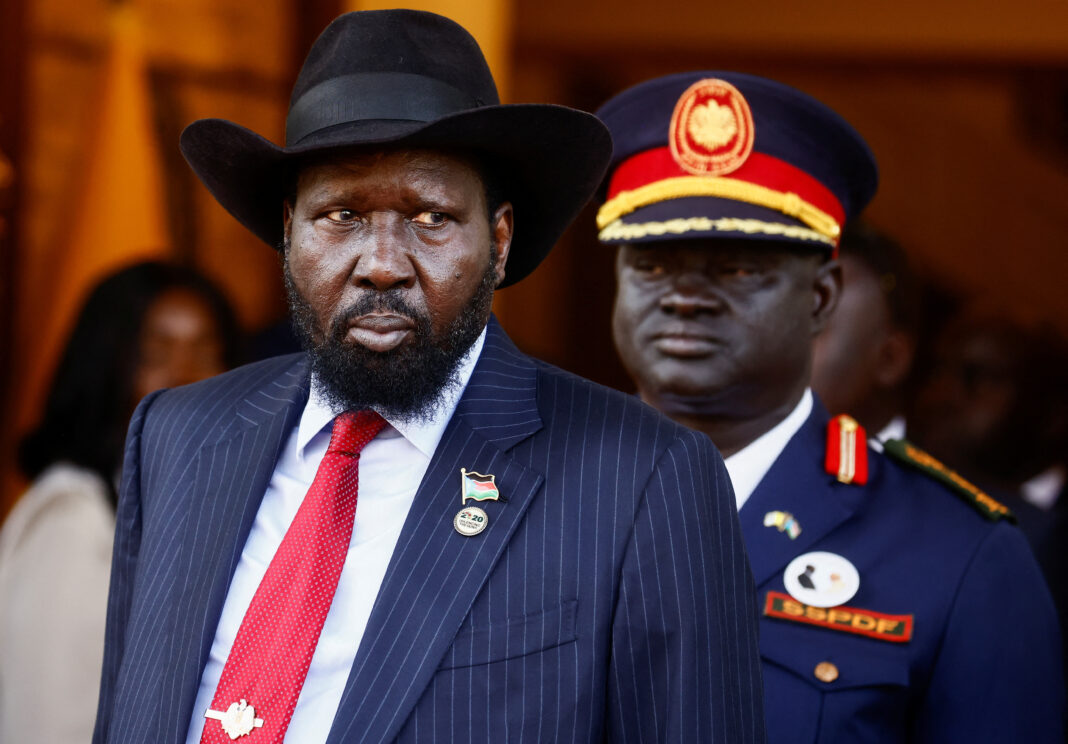South Sudan’s President, Salva Kiir Mayardit–| Credit REUTERS|.
South Sudan’s National Legislative Assembly on July 3, 2024, amended the law governing the National Security Service (NSS), in ways that will further undermine human rights and entrench the agency’s longstanding abuses.
Parliament passed amendments to the 2014 National Security Service Act after a four-hour debate by a vote of 274-114 that will allow the agency to continue arresting or detaining people without a warrant. Human Rights Watch and other rights organizations have documented how the agency has used the 2014 law’s broad and vague powers to establish a regime of censorship, surveillance, and other abusive interference with fundamental rights and freedoms.
“Instead of reining in the security service, which has been the government’s preferred tool of repression, South Sudan’s parliament has further emboldened the agency,” said Laetitia Bader, deputy Africa director at Human Rights Watch.
“This was an opportunity to promote and enhance justice and human rights but instead parliament chose to strengthen a security service that routinely abuses rights with impunity.”
The security service has exercised these powers without meaningful judicial or legislative oversight, and its agents are rarely punished for abuses.
The National Constitutional Amendment Committee drafted the amendments as part of reforms initiated by the Revitalized Peace Agreement of 2018. When the committee failed to reach consensus on the agency’s arrest authority, the bill was referred to the Justice Ministry in 2019 and in April 2021, to the presidency for resolution. In August 2022 the presidency sent the bill back to the Justice Ministry, which suggested limiting the agency’s powers of arrest and detention.
On February 21, 2023, several media outlets reported that the presidency had agreed to remove the relevant provisions (articles 54 and 55) and abolish the agency’s authority to arrest and detain anyone with or without a warrant.
But the bill presented to parliament in May 2023 by the justice minister, retained arrest powers but limited them to use “under emergency circumstances,” and also explicitly allowed the agency to arrest an individual without a warrant if they are suspected of broad “crimes against the state.” The bill has a broad definition of “crimes against the state” as “any activity directed at undermining … the government” and references the provision on “crimes against the state” in the 2008 Penal Code, which is equally vague and problematic.
The government has in the past used trumped-up charges of “crimes against the state” to restrict freedoms of expression, assembly, and association, in particular, peaceful exercise of rights by political opposition, or other public criticism of government policy and actions
In July 2023, Human Rights Watch urged parliament to remove the agency’s powers of arrest or at a minimum to limit its powers of arrest to those that require a judicial warrant.
Several parliament members who had voted against the agency having powers of arrest and detention expressed their dismay to Human Rights Watch.
“We have argued that the agency has no prosecutorial or arrest powers and should only have an intelligence gathering role as envisioned by the constitution,” a member affiliated with the South Sudan Opposition Alliance told Human Rights Watch.
“But certain powers believe it is better to embolden the agency more and more. It is a very dark omen for the days to come that the agency can now without fear, or doubt, pick any member of the public up without any warrant.”
Human Rights Watch has repeatedly called on the South Sudanese authorities to limit NSS powers to intelligence gathering, as envisioned by the Transitional Constitution of 2011, which mandates the agency to “focus on information gathering, analysis and to advise the relevant authorities.
Over the past few months, the agency has unlawfully detained activists, critics, and even foreign citizens. People interviewed said that in at least seven cases, the agency arrested people without warrants, detained them for long periods without access to legal counsel and in some cases, also held them incommunicado.
Human Rights Watch has also received reports of torture and ill-treatment. For example, one person told Human Rights Watch that he was caned daily for the first three days when he arrived at the agency headquarters, Blue House, in Juba. He said that every time his wounds began to heal, he would be beaten again. Detainees are held in overcrowded and unsanitary cells and eat once a day.
The agency also continues to hold Morris Mabior Awikjiok, a South Sudanese critic and former refugee in Kenya, since February 2023, even though the justice minister directed the agency in June this year to free him.
Victims of agency abuses have no credible, far less effective, avenues in South Sudan to seek redress.
South Sudan’s partners should raise concerns about the agency’s record of abusive behavior and that the law is likely to facilitate further abuses, Human Rights Watch said.
The next step is for the speaker of parliament to refer the bill to the president for assent, and the president has 14 days to assent or refer the bill back to parliament for reconsideration, noting his reservations.
“President Kiir should reject the broad powers of arrest and detention and send the law back to parliament so they can bring the law in line with the constitution and international human rights standards,” Bader said.
“This could go a long way to curtail abuses by the security service and contribute to a rights-respecting South Sudan.”




